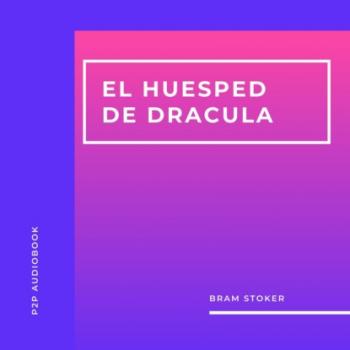Bram Stoker
Список книг автора Bram StokerDrácula
"No pude descubrir ningún mapa ni obra que arrojara luz sobre la exacta localización del castillo de Drácula, pues no hay mapas en este país que se puedan comparar en exactitud con los nuestros; pero descubrí que Bistritz, el pueblo de posta mencionado por el conde Drácula, era un lugar bastante conocido. Voy a incluir aquí algunas de mis notas, pues pueden refrescarme la memoria cuando le relate mis viajes a Mina." "Drácula" es una novela publicada en 1897 por el irlandés Bram Stoker, quien ha convertido a su antagonista en el vampiro más famoso. Se dice que el escritor se basó en las conversaciones que mantuvo con un erudito húngaro llamado Arminius Vámbéry, quien le habló de Vlad Drăculea.
Bram Stoker: Dracula (English Edition)
"Suddenly, away on our left, I saw a faint flickering blue flame. The driver saw it at the same moment; he at once checked the horses, and, jumping to the ground, disappeared into the darkness. I did not know what to do, the less as the howling of the wolves grew closer; but while I wondered the driver suddenly appeared again, and without a word took his seat, and we resumed our journey. I think I must have fallen asleep and kept dreaming of the incident, for it seemed to be repeated endlessly, and now looking back, it is like a sort of awful nightmare. Once the flame appeared so near the road, that even in the darkness around us I could watch the driver's motions. He went rapidly to where the blue flame arose—it must have been very faint, for it did not seem to illumine the place around it at all—and gathering a few stones, formed them into some device. Once there appeared a strange optical effect: when he stood between me and the flame he did not obstruct it, for I could see its ghostly flicker all the same."
"Dracula" was first published in 1897. The gothic horror novel tells the story of Count Dracula's attempt to move from Transylvania to England so that he may spread the undead curse, «Dracula» has had a great impact on many literary genres including vampire literature, horror fiction, and the gothic novel.
Bram Stoker: Dracula
Jonathan Harker, Mitarbeiter einer Londoner Anwaltskanzlei, reist nach Transsylvanien. Er soll Graf Dracula beraten. Der zurückgezogen lebende Graf beabsichtigt, nach London zu ziehen. Schon bei der Ankunft in Transsylvanien bemerkt Harker die Angst der Bewohner vor dem Grafen. Harkers Recherche zu den Gründen bleibt erfolglos. Niemand wagt es, sich zu Dracula zu äußern. Als Harker mit Dracula ins Gespräch kommt, bemerkt er, dass mit dem Grafen etwas nicht stimmt. Fluchtartig verlässt er das Schloss. Doch Dracula folgt ihm bis nach London. Mit «Dracula» hat Bram Stoker das Genre des Vampirromans begründet. Der Klassiker der Weltliteratur wurde unzählige Male verfilmt, vertont und als Bühnenstück inszeniert.
Dracula (Bram Stoker) (Literary Thoughts Edition)
Literary Thoughts edition
presents
Dracula by Bram Stoker
–
Dracula, the 1897 published Gothic horror novel by Irish author Bram Stoker, tells the story of the Transylvanian noble Count Dracula and his attempt to move from Transylvania to England. In England he may find new blood and spread the curse of the undead. But he is faced with a small group of men and women led by Professor Abraham Van Helsing.
All books of the Literary Thoughts edition have been transscribed from original prints and edited for better reading experience.
Please visit our homepage literarythoughts.com to see our other publications.
Dracula
Se proporciona una rica selección de antecedentes y materiales de origen en tres áreas: Contextos incluye probables inspiraciones para Drácula en los trabajos anteriores de James Malcolm Rymer y Emily Gerard. También se incluye una discusión de las notas de trabajo de Stoker para la novela y «Invitado de Drácula», el capítulo inicial de Drácula. Reviews and Reactions reimprime cinco reseñas tempranas de la novela. «Variaciones dramáticas y cinematográficas» se centra en las adaptaciones teatrales y cinematográficas de Drácula, dos indicaciones del atractivo inquebrantable de la novela. David J. Skal, Gregory A. Waller y Nina Auerbach ofrecen sus variadas perspectivas. Se incluyen listas de verificación de adaptaciones dramáticas y cinematográficas.La crítica recoge siete interpretaciones teóricas de Drácula por Phyllis A. Roth, Carol A. Senf, Franco Moretti, Christopher Craft, Bram Dijkstra, Stephen D. Arata y Talia Schaffer.









